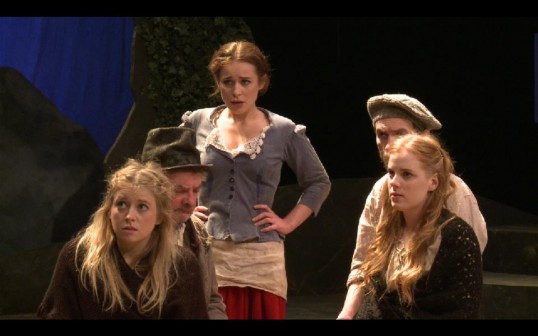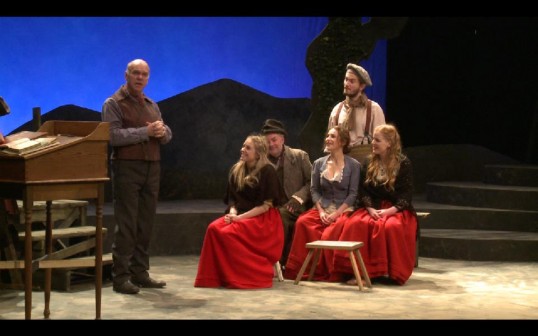Review – Translations
✭✭✭✩✩ Hidden depths
King’s Theatre
Mon 15 – Sat 20 April
Timing is all. And Translations, Brian Friel’s play about a hedge school in County Donegal in 1833, gathers an extra layer of resonance as it arrives at the King’s for a week long run.
What’s already there – and obvious – is a tale of language, oppression and imperialism as the British Army arrives in the Irish speaking parish of Ballybeg on their mission to map the country.
In the process of the mapping exercise, and many would argue the reason for it happening at all, they are to anglicise all the local names. A tricky task in this Irish Gaelic-speaking parish where only the school master and his sons speak English.
Adrian Dunbar’s clear and measured touring production, created for the Millennium Forum in Derry, does a great job in bringing the hedge school to life, and putting the emotional bones on the relationships between the soldiers and the locals.
The lack of a common language is clearly expressed. The actors all perform in English, whichever language their characters are talking. It keeps you on your toes, remembering who can or can’t understand each other on stage, but Friel’s writing keeps the difficulties to a minimum.
The hedge school is where the locals come to learn in the evenings after work. From basic literacy and numeracy the lessons extend to Greek and Latin – but not English – with the Master, Hugh (Des McAleer), calling out phrases and words for his students to translate as he reads from the classics.
Which immediately puts Nick Tizzard’s Captain Lancey of the British Army at a disadvantage, at least in the locals’ eyes. Here they are, happily conversing in Latin and Greek – even praising the subtleties they afford in poetic composition – and not only does Lancey not have a word of Irish, but he can’t even muster a “hello!’ in either ancient tongue.
A great buzz of normality and banter
To Lancey they are nothing but illiterate barefoot peasants, however. He holds up the promise of greater equality and tax reform, descending into the most childish explanation a map as a picture of the world as he tries to explain the reason for the mapping.
Dunbar keeps it light throughout the low-key first half, bringing out some fine performances all round.
Niall Cusack takes the best role as Hugh’s old pal Jimmy Jack, who doesn’t appear to have washed or changed his clothes for several decades. He reads Homer in the original, flies off into fancies about how he is going to marry Athene, Zeus’ daughter, and gets drop-down drunk.
As Hugh, McAleer finds the necessary pomposity, but doesn’t quite grab the most crucial lines and make them work as well as Cusack does. Conan Sweeney (Doalty), Muireann Bird (Bridget) and Genevieve Louise Barr as the mute Sarah, round out the hedge school students.
If there’s a great buzz of normality and banter about them, the narrative is driven elsewhere. Barry John Ward is particularly good as Hugh’s lame son, Manus, an aspiring teacher who takes class in his father’s place and has plans with Jade Yourell’s perky local girl Maire to get married.
Manus’ returning brother Owen, who in the pay of the army as a translator, is given all the necessary complexity by Dermott Hickson, as he first helps find suitable replacements for ancient names, then realises the loss of a heritage which those replacements will cause.
But it is from Paul Woodson’s Lieutenant Yolland that the drive really gets going – he clearly has eyes for Maire. And just as he can’t hold his drink when he’s around Owen, he can’t hold his emotional feelings when he is around Maire.
So far, so entertaining and, as it develops, a fascinating examination of the way that the British used the English language to create an empire, whether it was Ireland or India.
What picks this up and dunks right it into this week comes in the final moments of the play.
The ending itself is not particularly well finessed by Dunbar, who doesn’t find the necessary crescendo into the play’s dying moments to make its haunting finale seem anything more than a petering out. But what he does succeed in doing, thanks to Cusack, is forcing a line about our present being defined by our history. Not the history as it happened, but history as it is remembered or written down in stories.
Buy the script:
In this particular week, when both sides in the debate about Thatcher’s funeral are able only to agree that she was divisive, and seem unable to even understand each other, Translations takes on a new level of significance.
As those on the right seek to stamp their own interpretation on the story of the last forty years, the play takes on increasing significance for those who simply do not agree that Thatcherism was either necessary or beneficial.
In the same way that Owen realises that the changing of a name goes much deeper than the surface of a map, so the argument about the Thatcher funeral is much deeper than affording due respect to a mortal being who has ceased to be, but becomes a battle over what our future can become.
The stories we tell of society, of how our was in the decades from the 60s into the Millennium, and of how it came to be that way, will become the map of what our future might become. So that the political group which defines or writes those stories, will be the one which maps our future.
If such depth owes rather less to the production than it does to the play itself, it does make the production all the more fascinating.
Running time 2 hours 20 mins.
Run ends Saturday 20 April 2013.
King’s Theatre, daily, 7.30pm (2.30 matinee Wed, Sat).
Full details on King’s Theatre website: www.edtheatres.com
Translations continues on tour:
Grand Opera House, Belfast, Tue 23-Sat 27 April.
ENDS






















